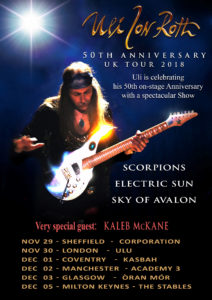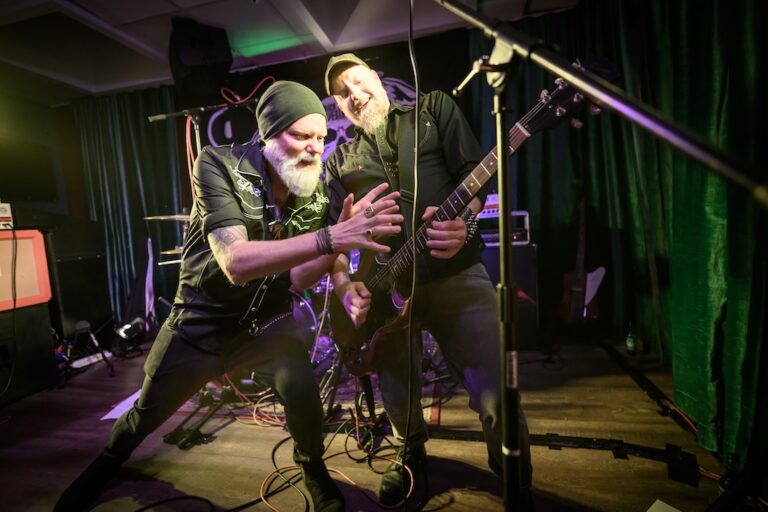At the beginning of the year, we were lucky enough to attend one of the G3 shows which saw Joe Satriani joined by John Petrucci and Uli Jon Roth. Each guitarist bought their own distinctive style and skill to the experience, but the one who stood out for us was Uli Jon Roth. Quietly magnificent, he took the audience on a journey that took in a variety of influences before culminating in the still-untouchable grandeur of the Scorpions’ Sails of Charon. With a very special fiftieth anniversary tour rapidly approaching, we took the opportunity to speak to Uli about his enduring legacy.
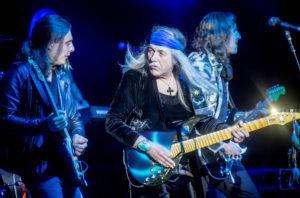
We were very lucky, we got to see you play on the G3 tour in Birmingham…
Ah! The G3, yeah! That was the last show on the tour actually.
It was an amazing show. We were very moved by your music and it was, I thought, the perfect mix between technicality and passion, which is something I look for and admire in any musician…
That’s a good complement, thank you very much! It’s good to hear that you liked it, you know. I think it was a good concert, the Birmingham one, as I remember. In fact, all the ones in England were… yeah.
I love the idea of having three people who are very much masters of their art and you get such an interesting mix because the three of you are such diverse styles, but at the heart of it all is that skill and love of the music…
That’s very true! We all love music!
I find your career fascinating because, although you’ve been in hard rock for the majority of your life, you’ve also done some very interesting classical and progressive material
Yeah! I spent a long time doing nothing but the classical and symphonic material but, unfortunately, I have to say that I haven’t really released enough to show for it. So, I haven’t much to show for it, but that’s largely because a lot of that stuff ended up in the drawer over the years, and I intend to go back…
I always wonder… classical music is very different and the discipline and power involved in creating something classical has the ability to really inform rock music that goes beyond the typical genre tropes.
Um… you’re right, it’s a completely different approach I would say, and yes, discipline is the key word. You have to be really… you can’t be nonchalant or improvisational. In that sense you’re a little bit more free when you’re playing rock music. You have more freedom to change as you go along. But, what I find intriguing is that the combination of orchestral writing and orchestral rhythms and the electric guitar and rock voices – it’s still largely unexplored. I still see the potential for new music to come from there. And good music!
I remember speaking to a guitarist some time back and we were talking about how, for many guitar players, the guitar is a way of mimicking the human voice and when you play a solo, you think about mimicking the cry that you get from a person and I wondered if, when you’re playing, you think about singing the guitar – I don’t know if that resonates with you?
It resonates with me and it’s true for some of the time. It really depends on the speed of the solo and the amount of notes you’re playing. If it’s a slow lead, and melodic, then singing is absolutely the right word and the right way of describing how I would approach it. But, when it’s more technically demanding – more virtuoso – then it’s more different kind of thinking. And there are some guitar solos where the two combine.
The key, also, I think is that it’s not just what you play, but the spaces that you leave and the pauses you allow so that the music ebbs and flows – that’s important in any piece of music.
Yeah, it’s also a question of approach. Some players play non-stop and they’re like an orchestra unto themselves, whereas others, say at the far end of the spectrum B.B. King, who just leaves gaps and occasionally plays a few notes and it works for that, you know and… yeah, particularly blues players leave a lot of gaps and hard rock players, or metal players, have a different approach. A blues player is always more emotional. You’re almost listening to where you let the spoken refrain end before you say something new.
I’m conscious that we’re talking for a very specific purpose and I’ve gone off on a bit of a tangent because I find the story behind the guitar work so fascinating, but this is a very special year for you, because you’re doing this series of fiftieth anniversary shows. Has it been challenging to look through your career to finds the pieces that reflect your career at this point?
Yes, definitely challenging because, for certain reasons, we can only play so many songs in an evening and I have such a vast repertoire over the years and I’ve done quite a few different things that it wasn’t exactly easy to arrive at the “definitive” set list. And, I don’t think I have yet. From this vast pool of things that could be played, I tried to extract the things that should be played, that have to be played and that would be best represented in a concert. Because, of course, we’re not playing as an orchestra, we’re playing clubs or pubs or whatever and different types of music work better in that way. So, yeah, it has been a challenge to find a select list to play, because we’re doing two and a half hour plus shows (with an intermission) and it’s quite a cross section of where I’m coming from. That’s the result, and I’m sure as we tour with this, we’ll refine it and try out different things and see what sticks.
One of the things that really captured my attention at the G3 show was the way that you structured it in the same way that I’d construct an album, so we went from the Sky Overture through to the Sails of Charon and it was a remarkable voyage, and that was quite a short set, but it’s a challenge to create something that ebbs and flows in the same was a song or a record does.
You’re totally right. It’s very important when, and at which point, in the programme you’re playing a certain song. Some songs sound glorious in the first half, some will be great for the end, some will be great for the middle. Very few songs can do it all and, yes, it’s a little bit like structuring a menu or a movie – you need this ebb and flow, as you quite rightly call it. In a long show, it’s even more important. I think I’ve always been pretty good with set lists but there was a long period of time when I refused to have a set list and when I was free from it because I didn’t want to be tied down on stage which was fine – fair enough, I guess. But, nowadays… you have certain results you don’t get with structured sets – goods and bad, both good and bad. The good being that you might… first of all, each show is totally unique and not repeatable, but the downside was that sometimes the ebb and flow was not as good because nothing was premeditated. But also, the premeditated way can be a bit of a drag because, some evenings flow differently from others. You might find certain songs flow differently for certain audiences on certain days and they don’t have the desired effect and sometimes, during a show, it’s wise to have that flexibility to change the songs and think “oh! I should play that one now!” because the chemistry of the evening demands it, rather than sticking rigidly to a set list. Nowadays, I’ve realised that it’s such a different set that we’re doing in November, that I have a desire to get it right, so I’ve discovered that, for myself (and just for myself) , playing live is an art form in itself and I want to just get it right and make sure that ample sparks are flying every evening and everybody’s hopefully having a really good time!
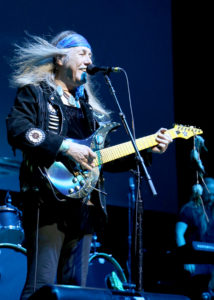
One of the things that also is interesting to note about your back catalogue is that it’s so incredibly diverse – it touches on Hard Rock, more progressive pieces and classical stuff and it’s also interesting that you’ve had the opportunity to guest with a number of different bands including the Smashing Pumpkins – so, when you’ve got such a wide back catalogue, I guess you find you’re speaking to a very diverse audience?
I guess so. Yes, I mean my life musically and my choice of material or bands has been a reflection of my journey through music, which has largely been a journey of discovery. Trying to find my way in music, you know. And the result of that was that, in the end, virtually every single album that I was involved in as a solo artist was pretty much completely different and I don’t know why that is, because I’m not really that different I guess, but that’s how it is. So, if anybody asks me what my most representative album is, that represents my music, I couldn’t really say. I think it’s the sum total of it all. There are some that I like more than other and some where I think maybe I succeeded more of achieving an aim or goal artistically, but that’s the reality. Every album is very different and that’s maybe confusing to the audience. I remember when I first left the Scorpions, a lot of people were expecting me to do something like Virgin Killer x 10 and then I came along with Earthquake and it was almost the polar opposite in more ways than one and quite a few people were disappointed. They thought I’d gone mad, or whatever but, afterwards, that album was recognized and, in some ways, it’s stood the test of time, I think. My intention wasn’t to do Virgin Killer x 10 – that’s why I left the Scorpions! I wanted to do Earthquake and I guess, sometimes you need to walk the distance to find what you want and I’ve never been afraid to go to strange places musically, as long as it felt organic and inspirational. That’s really the most important thing to me. It’s all about exploration. Not so much about music which pleases a crowd of people, which I don’t think I can anyway, because I don’t think I’m that kind of artist. A lot of artists are successful because they find a formula that works – they find something successful and then they spend the rest of their lives trying to recreate it and then people expect that kind of style and that kind of thing in their writing. But I’ve never been like that and I don’t want to be like that. My identity is exactly that I’m a bit of a musical chameleon. Although I don’t change colours that rapidly – it’s gradually – I’m like an explorer. I see things differently, musically. That’s why I’m sometimes that, and then sometimes something else, you know.
I love the idea of you as a musical explorer – I think that cuts to the heart what makes a guitarist or singer an artist. As a singer or a musician, you shouldn’t reach an end point, it’s always a journey of discovery and that way you’re always creating something new and maybe the audience will go with you, maybe not, but it’s the journey that’s important as anything else.
That’s exactly right. I’ve never reached an end point and there’s never been a single album that I’ve been totally happy with. They’re all just stations along the road and it is the journey that I’m interested in and that’s also why I like to improvise and change songs. In songs that I’ve played for years, I’m not afraid to change them now and then if I think it’s for the better. And I think that’s what keeps it fresh and authentic, because at the beginning it was written that way. We used to improvise an awful lot and I have always taken chances.
For me, music can be very evocative of landscapes and it can be very visually driven and you live in such a beautiful part of the world (Uli lives in Wales) that I was wondering if part of what you create is inspired by the landscapes in which you reside.
Not so much the landscapes. I do love the landscapes here. It’s ever so beautiful where we are. Wales is pretty much like Lord of the Rings territory, visually. But, in music, it’s not so much landscapes. Landscapes are the background maybe, for the foreground, like the harmonies and the rhythms… The melody, that’s different. Visually, I think in visual terms… I think very much in visual terms and when I write music, or am playing music, I set a vision in my brain – my imagination is always hyper-active. I see things and I feel things and every note evokes a visual sensation. And that makes it very easy for me because it’s almost like dreaming. Instead of just the sense of hearing, there’s also the inner-eyes to understand what’s going on. Because very often, the musical map follows certain roads and music for me is very much a chance to explore and that’s one of the most wonderful and most of the exciting aspects of music, is that each note is an experience and it allows you and your band to access all the powerful and undiluted range of emotions in the subconscious. It evokes sensations including physical sensations – talk about goosebumps or whatever and music is almost like nothing else because it’s straight to the heart.
As you’re preparing for this tour, one of the most important things is having the right people with whom to work. Do you have the same band, or do you have the same people you had on the G3 tour?
It’s pretty much the same band, except for the bass player who is, on this tour, an English bass player named Simon Foster, who’s got a really good voice and he will… it’s good to do my repertoire justice that we have a choice of good singers. There’s me just doing occasional bits of story-telling. Yeah, so I’m looking forward to that but it’s basically the same band as G3 and it’s pretty much the best band that I’ve had so far. I’ve known different musicians in various countries from when I travel, these are my favourites and they’ve been with me for quite a long time.
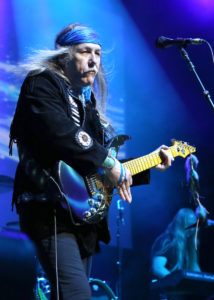
It’s an important tour and you’re playing lengthy sets and you’re looking back over a huge career – are there plans to record the set?
Yes, I do want to record it. It’s actually recording every evening from now on as a matter of course with at least five cameras, but it’s planned for a proper DVD release from our Japanese tour which, most likely, will happen in January where we’re playing a number of really nice halls out there with great atmosphere and hopefully we’ll get a good DVD out of it. But also, we’re planning to record our American tour which follows and you never know. Sometimes, certain shows surprise me, you know. And sometimes it’s those with less than perfect conditions – like club shows – are the very best and I don’t know why that is.
Maybe part of it is down to the proximity of the artist of the audience because, with a bigger venue, you get that scale and that spectacle, but then the connection can be lost…
It gets harder as the venue gets bigger and there’s something very exciting about playing an arena or big festival, but the music gets magnified to such an extent that some of the subtlety and deeper aspects are very often sacrificed in an event that size – especially in a stadium or a festival. The close proximity to the audience means that it’s kind of inspiring in a different way – that would be the reason why it is.
Within that the audience feed off the band and the band from the audience….
It’s real when you’re in a situation like this. When you’re at a festival, it can be surreal! You’re very far away from the audience and it’s kind of a strange atmosphere, almost like you’re in some strange theatre play, whereas in the smaller club, it’s as real as it gets.
It speaks to the amazing community and the ability of music to traverse any boundary and I think music is a great leveller between people.
Oh, I agree.
So, any final words on the tour that’s coming up?
Well, just that I’m looking forward to this tour and playing England. It’s one of my absolutely favourite places to play… Scotland too, because we’re doing Glasgow… and yeah, at the end of the year, I am looking forward to it. Are you going to a show?
I very much hope so – the G3 show was very special and I’d love to see an expanded performance.
That’s very kind of you. All I can say is that I’m aiming to surpass that level of what we played because, as you said, we had very little time and we really picked mostly the Scorpions stuff and I’m looking forward to having a much broader scope now including some of the best selections from Electric Sun, some of which I’ve also re-written to bring it to a more current level and we’re doing one of the Vivaldi pieces that I did – the Winter – so it’s a mixture of virtuoso and more rock pieces. There’s also time to whip out my eight string, flamenco Sky guitar with nylon strings and put a solo section in there – creating sonic landscape with that.
That’s such an amazing instrument – that’s the most recent of your Sky guitars I think?
Um… the most recent will be on that tour. Because we are always doing new prototypes – there are several this year and now I’m going to play the latest project. It’s called the Excalibur… Yeah! What a pretentious name, but it will fit the guitar when you see it! Hopefully when you hear it. It’s a seven string that’s all-singing, all dancing. The only thing it cannot do yet is play by itself but I’m working on that as well.
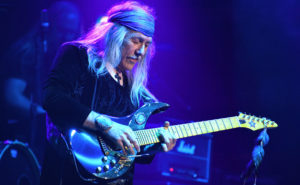
Fresh off his G3 European and UK tour with Joe Satriani and John Petrucci, former Scorpions guitarist Uli Jon Roth is widely regarded as one of the greatest guitar players ever. He is one of the last greats who is still around to present his magical style of playing which he already forged in the late Sixties when he was still in his teens. Uli played his first ever show in December 1968 – at the age of 13 – and to celebrate his upcoming 50th Stage Anniversary, he will play 6 very special UK concerts.
The UK tour starts atthe Corporation in Sheffield on Thursday 29th November, followed by University of London Union (Friday 30th November), Coventry’s Kasbah (Saturday 1 December), Manchester’s Academy 3 (Sunday 2 December), Glasgow’s Oran Mor (Monday 3 December) and Milton Keynes’ The Stables (Wednesday 5 December).
The two hour-plus programme will consist of carefully selected highlights from Uli’s entire musical career, which – by now – is spanning no less than 5 decades! The amazing thing is that Uli Jon Roth keeps on getting better, as we have seen amply demonstrated by his astonishing and powerful recent appearances at the
G3 Tour of Europe and the UK with Joe Satriani and John Petrucci.
In recent times, Uli has successfully revisited the early music of his celebrated Scorpions days which resulted in the superb “Scorpions Revisited” double CD and “Tokyo Tapes Revisited” DVD/Blu-Ray releases. The 50th Anniversary set will naturally include the best of that timeless material, including The Sails of Charon, In Trance, Fly to the Rainbow and many other songs.
As a logical continuation of Uli’s journey into his own musical past he will also be reconnecting with the second very important part of his unique musical journey – that of his ground breaking Electric Sun period – during which he took the art of electric guitar playing to a completely new and unprecedented level. In those early days, Uli was already forging the path and laying the ground work for later virtuosos such as Malmsteen, Eddie van Halen, Vai, Satriani, Jason Becker and a generation of younger players who came after him, with his novel use of highly melodic, classically inspired arpeggios and scales.
Virtually singlehandedly, Uli pioneered a unique style of guitar playing which – for the first time in the history of the electric guitar – combined complete technical mastery of the instrument with an intensely melodic and emotional appeal.
Thanks to Uli’s innovative and ground-breaking guitar playing and interesting compositions, Electric Sun became artistically influential and presented a unique blend, which was sometimes likened to a strange mixture, located somewhere between Beethoven and Hendrix. Back then, Electric Sun had many fans in the UK and on both sides of the Atlantic, but Uli decided to move on, and the year 1985 saw the end of Electric Sun as a band concept.
It has been more than 30 years since Uli performed the music of Electric Sun in the UK in an unforgettable series of shows which included Hammersmith Odeon, Manchester Apollo and Newcastle City Hall. After all these years, Uli has now taken a fresh look at this unique material, drawn from the altogether three
Electric Sun albums: Earthquake, Fire Wind and Beyond the Astral Skies.
Uli is reconnecting with his Electric Sun music after all this time and will bring that music to life in the here and now. Electric Sun and Uli fans alike will be delighted to finally hear these songs played live again by the master himself. Don’t miss this chance to witness an important part of rock history!
As a guitar player and artist, Uli Jon Roth is in a league of his own as legions of guitar players will attest. Joe Satriani has recently stated in one of his interviews that – of all the guitarists who ever played in the G3 – Uli impressed him the most. Yngwie Malmsteen, Jason Becker and other top-league players agree.
Uli’s playing and onstage presence is always inspirational and each concert is a unique event, because of his ability to make his instrument soar and sing emotionally and his spur of the moment improvisations. His musical scope is enormous and ranges from vintage Jimi Hendrix and Cream to the technically much more demanding world of classical music, yet somehow Uli manages to create exciting bridges between these seemingly musical opposite languages. Uli has written classical concertos and symphonic pieces and is equally at home in both worlds, which makes him a unique phenomenon and very rare breed among guitar players.
The 50th Anniversary Concerts are going to reflect that, as Uli will play excerpts from his stunning Metamorphosis of Vivaldi’s Four Seasons Concerto as well as several pieces which feature him on classical, acoustic and flamenco guitar.
No Uli concert would be complete without some of his interpretations of the guitarist who inspired him the most in his early days – Jimi Hendrix. Because of Uli’s deep understanding and inborn affinity with the artistry of the trail blazing musical genius from Seattle, many see Uli as the perhaps most qualified on-stage persona to imbue Jimi’s original music with the right kind of vibe and true spirit. And to hear Uli step into Jimi’s artistic footsteps live is always an eerie and unforgettable experience.
Uli Jon Roth will hit the UK stages with a superb band consisting of younger, extremely talented and accomplished younger musicians, each, a virtuoso in their own right. Together they are a powerful band – capable of playing anything – as we have clearly witnessed on the recent G3 Tour. Niklas Turmann, will be sing lead vocal, in combination with Simon Foster. The other young talent is guitarist David Klosinski, and together with Uli, those three are performing rare and very exhilarating triple harmony leads, thus doing complete justice to the sometimes-intricate guitar arrangements from Uli’s albums. It speaks volumes for their musical prowess that on the recent G3 tour, both David and Niklas were asked by Joe Satriani to contribute a solo each during the highlight of the G3 evening – the final Jam session. A rare honour indeed.
Uli’s voice is his legendary Sky Guitar which is his own invention, and which surpasses all current guitars on the market in terms of range and versatility. It is this instrument which allows him to play with a nigh-on six-octave range. Due to their ingenious design, Sky Guitars are the only guitars which make it possible to play Vivaldi’s celebrated violin concerto “The Four Seasons” at concert pitch, but with the sound of an electric guitar. Uli has recently founded his own personal company designed to produce these guitars exclusively – UJR SKY-GUITARS – and he will play a range of his new guitars during these shows.
Uli has launched the official UJR SKY-GUITARS website, featuring a range of new Sky Guitars built for discerning guitarists and collectors. The guitars come in three ranges – Pegasus, Aquila and Unicorn Sky Guitars. Visit www.sky-guitars.com to see the latest models.
